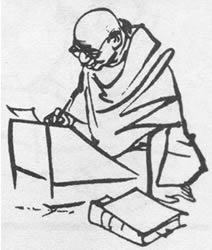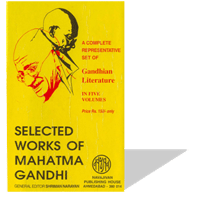
P.O. SEVAGRAM, DIST.WARDHA 442102, MS, INDIA. Phone: 91-7152-284753
FOUNDED BY MAHATMA GANDHI IN 1936
SECTION I : Selected Letters
[ from Selected Works of Mahatma Gandhi : Vol - 4 ]

SELECTED LETTERS
from
Selected Works of Mahatma Gandhi
Volume IV
Table of Contents
- Foreword
- Publisher's Note
SECTION I : LETTERS
- 1. To Dadabhai Naoroji
- 2. To G. K. Gokhale
- 3. To G. K. Gokhale
- 4. To Tolstoy
- 4A. From Count Leo Tolstoy
- 5. To Count Leo Tolstoy
- 6. To Leo Tolstoy
- 6A. From Count Leo Tolstoy
- 7. To Leo Tolstoy
- 7A. From Count Leo Tolstoy
- 8. To Maganlal Gandhi
- 9. To Maganlal Gandhi
- 10. To Narhar Shabhurao Bhave
- 11. To Mr Maffey, Private secretary To Viceroy
- 12. To W. B. Heycock
- 13. To Shankarlal on Ideas About Satyagraha
- 14. To Vinoba Bhave
- 15. To C F Andrews
- 16. To C F Andrews
- 17. To C F Andrews
- 18. To Kasturba Gandhi
- 19. To Kishorelal Mashruwala
- 20. To Sarojini Naidu
- 21. To Srinivas Sastri
- 22. To Srinivas Sastri
- 23. To Rabindranath Tagore
- 23A. From Rabindranath Tagore
- 24. To Rabindranath Tagore
- 25. From Rabindranath Tagore
- 25A. To Rabindranath Tagore
- 26. From Rabindranath Tagore
- 26A. To Rabindranath Tagore
- 27. To Rabindranath Tagore
- 28. To Rabindranath Tagore
- 29. To Rabindranath Tagore
- 30. To Rabindranath Tagore
- 31. To Rabindranath Tagore
- 32. From Rabindranath Tagore
- 32A. To Rabindranath Tagore
- 33. From G S Arundale
- 33A. To G S Arundale
- 34. To Every Englishman In India
- 35. To Viceroy
- 36. To Jawaharlal Nehru
- 37. To Jawaharlal Nehru
- 38. To Jawaharlal Nehru
- 39. To Jawaharlal Nehru
- 40. From Jawaharlal Nehru
- 41. To Jawaharlal Nehru
- 42. To Konda Venkatappayya
- 43. To T Prakasam
- 44. To Hakim Ajmal Khan
- 45. To Jamnalal Bajaj
- 46. To Mohomed Ali
- 47. To Motilal Nehru
- 48. To Motilal Nehru
- 49. To C Rajagopalachari
- 50. To C Rajagopalachari
- 51. To Kakasaheb Kalelkar
- 52. To A Friend
- 53. From Madeleine Slade or Miraben
- 53A. To Madeleine Slade
- 54. To Romain Rolland
- 55. To Romain Rolland
- 56. To Shri Shankaran
- 57. To Hermann Kallenbach
- 58. To Gulzarilal Nanda
- 59. To Dr Kailas Nath Kaju
- 60. To Dhan Gopal Mukherjee
- 61. To Henry S Salt
- 62. To The Viceroy
- 63. To Lord Irwin
- 64. To Reginald Reynolds
- 65. To Richard B Gregg
- 66. To Sir Samuel Hoare
- 67. To Ramsay MacDonald
- 68. To Pandit Malaviyaji
- 69. To The Secretary To The Government of Bombay, (Home Dept.), Poona
- 70. To Sir Tej Bahadur Sapru
- 71. To Carl Heath
- 72. To Carl Heath
- 73. To Carl Heath
- 74. To M A Jinnah
- 75. To M A Jinnah
- 76. To M A Jinnah
- 76A. From M A Jinnah
- 77. To M A Jinnah
- 78. From Subhash Chandra Bose
- 78A. To Subhash Chandra Bose
- 79. To Herr Hitler
- 80. To Every Briton
- 81. To Every Briton
- 82. To Generalissimo Chiang Kai-Shek
- 83. To Every Japanese
- 84. To American Friends
- 85. To Lord Linlithgow
- 86. To Lord Linlithgow
- 86A. From Lord Linlithgow
- 87. To Lord Linlithgow
- 87A. From Lord Linlithgow
- 88. To Lord Linlithgow
- 88A. From Lord Linlithgow
- 89. To Lord Linlithgow
- 90. To Agatha Harrison
- 91. To Winston Churchill
- 92. To Shriman Narayan
- 93. To Lord Pethick Lawrence
- 94. To Sardar Vallabhbhai Patel
- 95. To The Viceroy
- 96. To The Viceroy
- 96A. From Lord Mountbatten
- 97. To Abdul Ghaffar Khan
- 97A. From Abdul Ghaffar Khan
- 98. To A Friend
- 99. To Madame Edmond Privat
- 100. To The People of Gujarat
- Appendix I: Who Should Be Provincial Governors?
- Appendix II: A Psychological Explanation
- Appendix III: The Gandhian Constitutions for Free India
SECTION II : EXTRACTS FROM LETTERS
- Faith in God
- Religions and Scriptures
- Value of Prayer
- Truth and Non-violence
- The Science of Satyagraha
- Fasting in Satyagraha
- Unto This Last
- Khadi and Village Industry
- East and West
- Hindu-Muslim Unity
- Upliftment of Women
- The Good of All
- India's Freedom
- Education
- Caste System and Untouchability
- Brahmacharya
- Fearlessness
- Health and Hygene
- Self-restraint
- Self-development
- Selfless Service
- Voluntary Poverty
About This Volumes

Selected Works of Mahatma Gandhi comprises of Five volumes.
- Vol-I: Autobiography
- Vol-II: Satyagraha in South Africa
- Vol-III: Basic Works
- Ethical Religion
- Unto This Last
- Hind Swaraj or Indian Home Rule
- From Yeravada Mandir
- Discourses on the Gita
- Constructive Programme
- Key to Health
- Vol-IV: Selected Letters
- Vol-V: Voice of Truth
This book, Selected Letters, is volume-4.
Written by : M. K. Gandhi
General Editor : Shriman Narayan
Volume
Selected Works of Mahatma Gandhi : A set of five books
ISBN: 81-7229-278-3 (set)
Printed and Published by :
Jitendra T. Desai
Navajivan Mudranalaya,
Ahemadabad-380014
India
© Navajivan Trust, 1968
Download
Gandhi Letter 73 : To Carl Heath
Sevagram,
Wardha, 25-1-41
DEAR FRIEND,
I have your very kind letter. In it there is no acknowledgement of
my cable reply to your cable referred to in your letter. My reply
cabled on 27th October, 1940 was as follows:
"ALL EFFORT FAILED. INDIAN CONDITION WHOLLY DIFFERENT AND UNIQUE. PRESS GAGGED. HAVE STOPPED HARIJAN WEEKLIES, RESTRICTING CIVIL DISOBEDIENCE MINIMUM REQUIREMENTS OF NON-VIOLENCE."
Since then I have sent you the following cable in reply to yours of the last week of December:
"M.P.S. LETTER IGNORES FACTS, FRANK OPEN COMMUNICATION MADE IMPOSSIBLE. GOD BETWEEN US ALL."
I understand your argument. The Quaker attitude is individual. The
Congress attitude has reference to a big organization. The Congress
as an institution based on non-violence cannot distinguish between
one species of violence and another. I do not think that the world
will be any better if British arms are victorious over the German
through the means employed by the latter. In the ultimate the question
before the Congress is how to do away with the use of arms as between
man and man or nation and nation for the vindication of justice. The
universal proposition is implicit in India's fight for freedom through
non-violence.
You have rightly detected the flaw in the Congress attitude as reflected
in the Poona resolution. That was when and why I had ceased to guide
the Congress or take part in its deliberations. I withdrew my opposition
when the Congress retraced its steps through the later resolution
at Bombay. In my opinion it reflects no discredit on the Congress
that it could not abide by non¬violence in all circumstances.
Its policy is truth and non¬violence. Above all else, therefore,
it must be honest. When, therefore, it found the Poona demand flouted
it came round to its original position and invited me to lead the
battle of Civil Disobedience. I had no hesitation in responding as
I knew that the mass mind in India was by instinct non-violent. You
seem also to have missed the fact that the Poona resolution would
not have been passed at all but for my weakness of which I made ample
confession in the pages of Harijan.
My experience is that the Congress has grown progressively, though
slowly, in non-violence. And I would have proved an unworthy exponent
of non¬violence, if I had failed at the right moment to express
it through the Congress.
The Congress is as much anti-Nazism as anti- Imperialism. If the Government
had not thoughtlessly forbidden the anti-war activity of the Congress
and had not proclaimed it as pro-Nazi, they could easily have claimed
the whole of India as anti-Nazi—both that part which followed
the Congress non-violence and the other which believed in the use
of violence. Had it not done so, much bitterness would have been avoided
and the world would have profited by the lesson of tolerance and its
moral opinion would have been on the side of Britain. It is never
too late to mend one's error.
Whether, however, the error is admitted and mended or not, the course
of the Congress is clear. The conviction being purely moral it should
be pursued irrespective of the immediate result. A moral means is
almost an end in itself. Is not virtue its own reward?
Yours sincerely,
M. K. GANDHI
To
FRIEND CARL HEATH,
WHITEWINGS, MANOR WAY,
GUILDFORD-SURREY
From a photostat: S.N. 22663